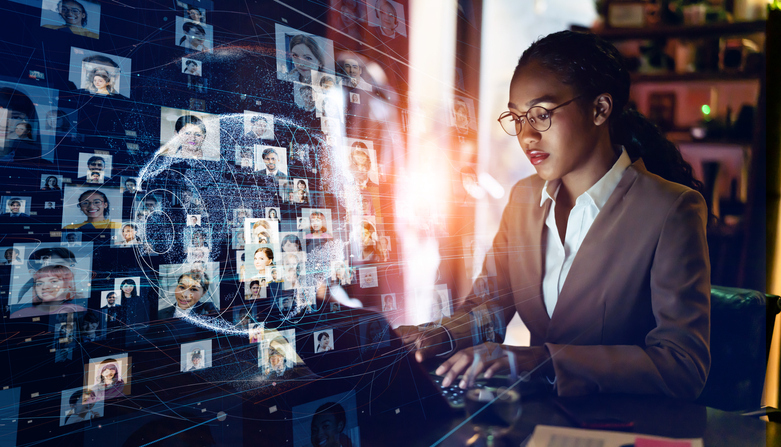But what does the future hold further down the line, in 10- or 20- years’ time?
We have all been confronted with fearmongering headlines, declaring the uprising of machines in the workplace, sent forth to take over our jobs. Vocal critics have expressed concerns about the increasing prevalence of robotics, automation and clever algorithms that will render the human workforce futile, with many office workers apprehensive about the imminent age of artificial intelligence (AI). In fact, in 2019 - a year before the latest digital revolution even took place - a report by YouGov revealed that two in five UK office workers feared that AI could soon replace them.
Is this an outcome we should expect? Probably not. However, there is some truth in the fact that these technologies will have a greater role to play in the corporate arena in the years to come. In many ways, the changes prompted by COVID-19 have only brought these developments closer to the present.
So, given the immense progress that has been made over the past couple of years, what might the world of work look like in a couple of decades?
Envisaging a smarter workplace
While there is no scientific method to clearly assess what the future holds, we can confidently anticipate that recent societal changes and technological transformations will shape the course of development. Most notably, there has been a shift in general attitudes towards the workplace, as businesses and employees reflect on the true value that it brings.
In the future, work will be something we do – not something we commute to. While employees will retain greater choice surrounding where and when they work, the communal benefits of collaboration and interaction will become the core focus of future setups. After all, it cannot be denied that a sense of community facilitates the sharing of knowledge and ideas: something that, in turn, sparks innovation and drives enterprise performance.
I would anticipate that organisations will therefore co-opt novel technologies to provide staff with increased opportunities to connect virtually, beyond the live-streamed conferences and ceaselessly scheduled meetings that we have grown to love (or hate). While work today is already becoming increasingly mobile, the workplace of tomorrow will see teams move towards the metaverse: businesses will transfer their activities to the virtual world, offering employees fully immersed digital experiences through extended reality (XR).
As individuals pursue non-traditional working arrangements, expect organisations to equip their future workers with virtual and augmented reality (VR and AR) technologies to ensure they remain aligned with the immediate team members and the wider business. These will transport them to simulated meeting rooms, creativity hubs, and lobbies, simply by wearing a pair of VR glasses. These tools, many of which are already in development, will enable staff to connect more authentically while working from home offices – allowing companies to traverse across different cities, continents and time zones, particularly as the effects of globalisation ramp up. Colleagues will enjoy more meaningful opportunities to collaborate and will feel more present and engaged despite communicating through digital mediums.
When location becomes largely irrelevant, and businesses draw their memberships from around the world, we will be faced with an even more competitive labour market than we see today.
These technologies will also be a great help in keeping staff up to date with their training and practice-based skill development. Take for example a junior doctor, who needs to practice a complicated heart procedure – individuals will be able to first practice these operations in a simulated environment, where mistakes can be made and corrected without running any risks to their patients.
Meanwhile, office workers who want to bolster their soft skills – for example, their public speaking abilities – will be able to populate virtual board rooms with stand-in staff members, so that they can rehearse their presentations in preparation for important meetings. What’s more, they will likely be able to do this with handy virtual assistants by their side, who can provide feedback on their performance and suggest areas for improvement, whether that is fixing their posture or adapting their transitions.
Lifelong learning will be a greater priority
The likes of Neuralink and Google’s DeepMind have been making headlines for years – from solving the protein folding conundrum to setting plans to implant microchips into the human brain, allowing individuals to control devices with their minds. I would wager that when most people think of AI, these more sensational stories come to mind. However, the workers of tomorrow have some equally impressive advances to look forward to.
One such development will be the introduction of AI-driven technologies that can account for the human fallibilities that so often set us back in our working lives – such as oversights and memory blanks.
Unlike humans, AI has a virtually infinite ability to recollect information, which will allow workers to ask questions about past events and receive succinct and accurate answers to their burning queries. As businesses introduce new policies and guidelines to workers, these systems will also have the ability to proactively push new information to employees as and when the need arises. This will ensure that professionals are up to date with the latest business-critical knowledge and avoid instances where mistakes are made due to a lack of awareness.
For professionals working in ever-changing sectors like the legal industry, the support of their trusted, AI-powered digital companion will not go unnoticed. When changes are flagged, all relevant employees will be alerted to the new guidance. To ensure that the information is understood and will not be forgotten, next-gen AI solutions will probe users’ knowledge about different concepts and encourage them to apply it in practice. For instance, they might be offered theoretical scenarios and quizzed about the most appropriate course of action.
More importantly, recent advances in natural language processing (NLP) and speech recognition means that these devices will support conversations that are not unlike those we share with our colleagues. Already, conversational AI is entering the fold to facilitate verbal and written conversations in natural language, that are far removed from the inflexible interactions we have been exposed to through traditional chatbots. As these abilities are improved upon, the workforce of the future will be unable to tell their digital assistants apart from their colleagues – meaning they can rely on the former when questions or issues arise in their day-to-day roles.
This needn’t be confined to 9-5 work hours, either. Employees will be able to learn at their leisure and turn to their devices when they want to brush up on their knowledge or investigate how specific business issues were solved in the past. AI-driven assistants will quickly appreciate an individual’s strengths and weaknesses based on ongoing interactions, and thereafter deliver resources in a format that is best suited to their unique learning style and current level of understanding. These tools will be able to use this information to pre-empt new lines of enquiry and further areas of interest so that employees can always be learning on the go.
When location becomes largely irrelevant, and businesses draw their memberships from around the world, we will be faced with an even more competitive labour market than we see today. Consequently, professionals will need to become more adaptive and view lifelong learning as a core element of their careers. Positively, the task at hand will not seem so daunting when we have next-gen digital assistants on hand to ensure we are continuously up-skilling and re-skilling.
It’s important to note that many of these technologies – particularly those that focus on the prospect of continuous, lifelong learning – aren’t decades away. Quite the contrary, some emerging platforms are already on the horizon and will deliver on their promises much sooner than businesses might expect. Ultimately, the future of work looks like a very exciting place to be indeed. I look forward to seeing how the workforce adapts and develops over the next couple of decades, as well as the technologies that will be at the forefront of this revolution.
Nikolas Kairinos is the chief executive officer and founder of Soffos, the world’s first AI-powered KnowledgeBot. The platform streamlines corporate learning and development (L&D) to deliver seamless professional training for employees. You can follow him on LinkedIn and Twitter.











